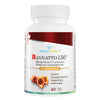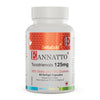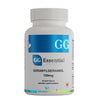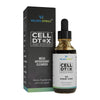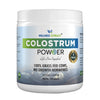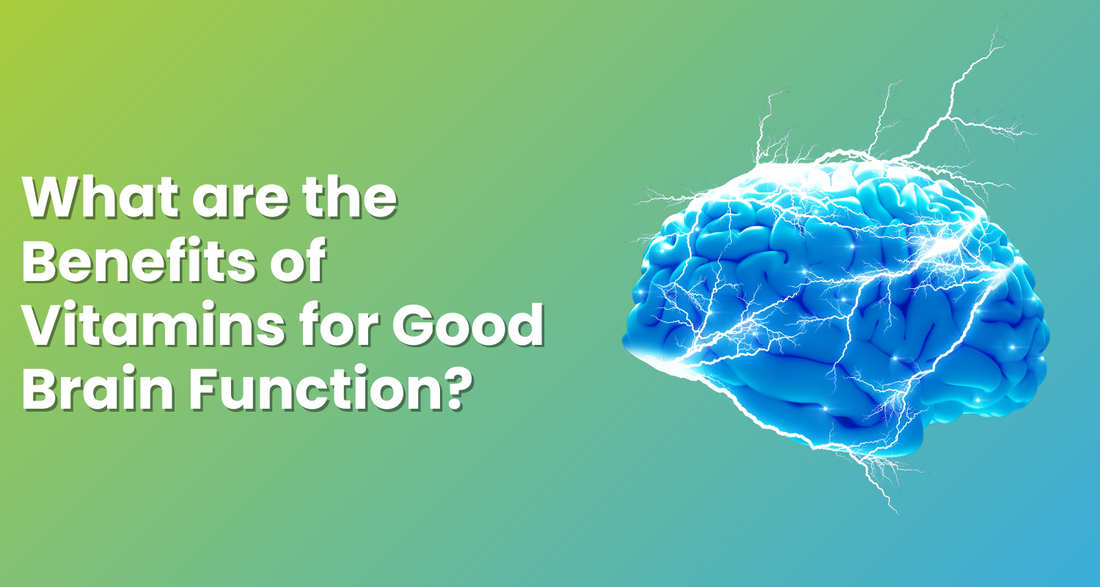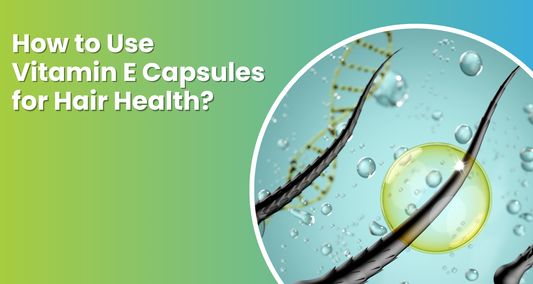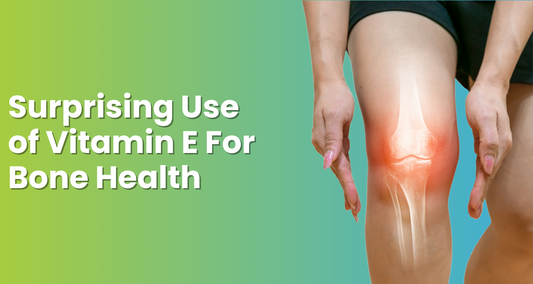Nourishing your brain with the right nutrients may significantly support your cognitive abilities, mood, and overall mental health. With this blog post, you can learn about the role of various Vitamins in safeguarding your brain’s health and enhancing its performance.
From the powerful antioxidants in Tocotrienols Vitamin E to mood-uplifting B vitamins, we’ll explore how vitamins can contribute to optimal brain function. Whether you’re looking to sharpen your focus, improve memory, or simply support your brain’s overall well-being, the journey starts with what you put on your plate.
1. Tocotrienols Vitamin E for Brain’s Antioxidant Support

When it comes to supporting your brain’s health, tocotrienols Vitamin E, an advanced form, stand out as some of the best vitamins for brain health. This powerful antioxidant may aid in protecting your brain cells from the damaging effects of oxidative stress, a key factor in the aging process and the development of neurodegenerative diseases.
Unlike the more commonly known tocopherol forms of vitamin E, tocotrienols Vitamin E are distinguished by their unique chemical structure, allowing them to distribute more efficiently throughout your body’s cells, including those in your brain.
This enhanced distribution means they can offer superior protection against oxidative damage and inflammation, which can adversely affect your brain health over time. Incorporating tocotrienols into your diet can be a wise strategy for maintaining brain health.
Also read: Is Vitamin E Good for Brain Function?
Vitamin E for Fatty Liver - How Much Vitamin E is Good for Your Liver?
2. Vitamin C May Lower the Risk of Memory Loss

Vitamin C, often celebrated for its immune-boosting effects, also stands as one of the pivotal vitamins for good brain function. Its potent antioxidant properties may protect the brain from oxidative stress but also play a crucial role in synthesizing neurotransmitters that facilitate brain function. This vital nutrient, therefore, is among the top vitamins that are good for brain function, potentially lowering the risk of memory loss and supporting overall cognitive health.
This essential vitamin is abundant in fruits and vegetables, such as oranges, strawberries, bell peppers, and broccoli, making it easily available through a healthy and balanced diet. Beyond its antioxidant capacity, Vitamin C is essential for repairing brain tissue and producing collagen, which supports the health of brain vessels.
By ensuring that you’re getting plentiful Vitamin C, you’re not just supporting your body’s immune system but also nurturing your brain, potentially reducing the risk of cognitive decline and memory loss.
Adding sufficient Vitamin C into your diet can be a proactive step to safeguard your brain health. It can be a simple yet effective strategy to maintain overall cognitive vitality well into your later years.
Also read: An Ultimate Guide On What Does Vitamin C Do For Your Skin?
3. Vitamin K to Support Cognitive Function

Vitamin K is generally overlooked in discussions about brain health. However, it emerges as a key brain health vitamin. Recent research suggests that Vitamin K could be one of the best vitamins for brain health, contributing significantly to cognitive function and the overall health of your brain.
Vitamin K synthesizes sphingolipids, a class of compounds crucial for brain cell structure and function. These lipids are fundamental components of the brain’s cell membranes. They may play a pivotal role in cell signaling and maintaining the integrity of neural connections. By ensuring adequate intake of Vitamin K, you are supporting the structural and functional maintenance of your brain cells, potentially enhancing cognitive function and preventing cognitive decline.
You can find Vitamin K in various foods, including leafy green vegetables like spinach, kale, and broccoli, as well as in fermented foods and some animal products. Adding these foods to your diet may support your body’s overall health. It can nurture your brain explicitly, making Vitamin K a critical component among the best vitamins for brain health.
Prioritizing this nutrient in your diet could be an intelligent move in preserving your cognitive abilities and ensuring long-term brain health.
Also read: How Will Research Shape the Future of Vitamin K and Coagulation?
4. Vitamin B for Mood and Mental performance

The B-vitamins, a group of water-soluble nutrients, are pivotal in maintaining optimal brain function and mood regulation, earning them a spot as a critical brain health vitamin and one of the best vitamins for brain health. These vitamins, including B6, B12, and folic acid, are essential in producing brain chemicals that affect mood and other functions.
A deficiency in these B vitamins may decrease the production of critical neurotransmitters like serotonin and dopamine, directly linked to mood regulation and mental performance. Ensuring an adequate intake of these vital nutrients directly supports your mental health and cognitive functions.
Foods rich in B vitamins include whole grains, meats, eggs, dairy products, leafy green vegetables, beans, and peas. Whether aiming to improve your cognitive function, boost your mood, or maintain a healthy brain, prioritizing B vitamins is wise. They are a fundamental brain health vitamin category, integral to achieving and maintaining the best vitamins for brain health in your nutritional strategy.
Also read: What is Vitamin B12 Good For? Essential For Health & Energy
The ABCs of Biotin: What Does Biotin Do for the Body?
5. Ginkgo Biloba and Omega 3s May reduce Depression-related Symptoms
Natural supplements like Ginkgo biloba and Omega-3 fatty acids stand out in managing depression, offering support beyond conventional vitamins for good brain function. These compounds are celebrated not just as vitamins that are good for brain function but also for their potential to mitigate symptoms associated with anxiety and depression.
-
Ginkgo biloba, a herb renowned for its antioxidant properties and ability to enhance blood circulation, is thought to positively affect your mental health. By supporting blood flow to the brain, Ginkgo biloba can aid in better delivery of oxygen and nutrients, potentially easing anxiety symptoms and enhancing cognitive function.

-
Omega-3 fatty acids in fish oil and flaxseeds are essential fats your body cannot produce. These fats are crucial for maintaining the fluidity of your brain’s cell membranes and play a significant role in reducing inflammation, a known factor in the development of depression. Regular intake of Omega-3s has been associated with supporting mood and cognitive function, making them a vital component of your dietary strategy to combat depression.

Also read: Omega 3 Fatty Acid Supplement Benefits & Guide
Ginkgo biloba and Omega-3 supplements and a balanced diet can offer a holistic approach to uplifting your mental health. This natural synergy may not only enhance your brain function but also provide a protective shield against the symptoms of anxiety and depression.
How to Choose Brain Health Supplements?

With a plethora of supplements available, making an informed decision requires understanding which ingredients support brain health, consulting with healthcare professionals, and considering your specific health needs and goals.
Whether you’re looking to improve focus and memory retention or protect against cognitive decline, selecting the right brain health supplements can have significant benefits for your brain health. Here are some critical pieces of advice to keep in mind during your search:
- Research the Ingredients: Look into the science behind the ingredients listed in a supplement. Some nutrients and vitamins have been studied more extensively for their effects on brain health, such as Tocotrienols Vitamin E, omega-3 fatty acids, B vitamins, antioxidants, and certain minerals.
- Check for FDA Warnings: The FDA periodically issues warnings about supplements that may contain harmful ingredients or make unfounded health claims. They must check their website for any alerts or recalls related to brain health supplements.
- Quality Assurance: Choose products verified by third-party organizations such as the U.S. Pharmacopeial Convention (USP), NSF International, or ConsumerLab. These certifications can assure the product’s quality, purity, and potency.
- Be Wary of Claims: Be skeptical of supplements that claim to dramatically improve brain function or prevent cognitive decline. The FDA does not allow supplements to claim they can treat, diagnose, prevent, or cure diseases.
- Consult Healthcare Providers: Before starting any new supplement, it’s crucial to talk with your healthcare provider, especially if you have existing health conditions or are taking other medications. Your healthcare provider can offer personalized advice based on your health history and needs.
- Consider Your Diet and Lifestyle: Supplements should not substitute for a healthy diet and lifestyle. Eating a balanced diet rich in fruits, vegetables, whole grains, and healthy fats can support brain health more effectively than supplements alone.
- Assess Your Needs: Consider whether you have specific dietary deficiencies or health conditions that a supplement might address. For example, if you have a known vitamin B12 or D deficiency, supplementing with these vitamins might benefit your brain health.
- Read Labels Carefully: Pay attention to the dosage, instructions, and any warnings on the supplement’s label. It’s also important to check the ingredient list for any substances you may be allergic to or that could interact with your medications.
By following these guidelines, you can make a more informed choice about adding a brain health vitamin to your wellness routine, ensuring that it’s a safe and beneficial part of your overall strategy for maintaining cognitive function and well-being.
Take Home Message

In your journey to support your mental health, you’ll find numerous health supplements with significant potential to support brain health. You need to understand that the supplements primarily help those struggling with a condition or deficiency.
Ensuring you’re getting the right vitamins can be key to maintaining a healthy, vibrant mind. This isn’t just about adding supplements to your diet; it’s about holistically supporting your brain’s health for the long term.
Further readings –
